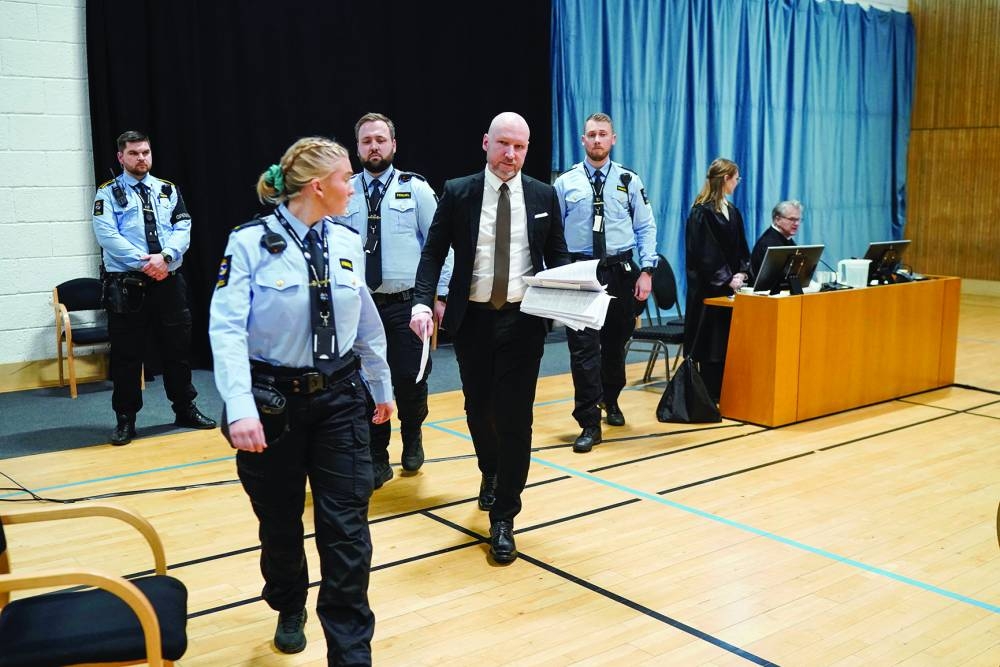Right-wing extremist Anders Behring Breivik, who killed 77 people in 2011, on Tuesday accused Norway of trying to “push him to suicide”, choking back sobs as he insisted he’s “still a human being”.
“I have the impression that the government’s aim is to try to push me to suicide,” Breivik said on the second day of a court hearing in the lawsuit he has brought against the Norwegian state over his prison conditions.
“They are close to succeeding. I don’t think I will manage to survive much longer without human relations,” the 44-year-old told the court, convened for security reasons in the gymnasium of Ringerike prison where Breivik is serving his sentence.
Held apart from other inmates in high-security facilities for almost 12 years, Breivik claims his extended isolation is a violation of Article 3 of the European Convention on Human Rights, which prohibits “inhuman” and “degrading” treatment.
On July 22, 2011, Breivik set off a bomb near government offices in Oslo, killing eight people, before gunning down 69 others, mostly teens, at a Labour Party youth wing summer camp on the island of Utoya.
He was sentenced in 2012 to 21 years in prison, which can be extended as long as he is considered a threat, which was Norway’s harshest sentence at the time.
At one point during his testimony on Tuesday, Breivik, who takes anti-depressants, broke down in sobs.
“I understand that...revenge is important and that a lot of people hate me. But I’m still a human being and there are limits to what a human being can take,” he said.
He said he had distanced himself from his crimes — which he attributed to his “vulnerability” to radicalisation — and said he thought of suicide “every day”.
Regaining his composure, he went on to discuss his ideological views.
Earlier in Tuesday’s proceedings, it emerged that Breivik tried to kill himself in 2020 by hanging himself with a towel, the state’s lawyers said, after informing prison guards of his plan.
The Norwegian state has argued that Breivik’s isolation is relative and that his prison conditions are warranted due to the risks he both poses and faces.
Breivik has access to several rooms including a kitchen, a TV room with a game console, and an exercise room.
When he requested a pet, he was provided with three budgies.
His human interactions are mostly limited to contacts with professionals such as wardens, lawyers and a chaplain.
Asked by government lawyer Andreas Hjetland what his thoughts were on Utoeya, Breivik said: “I am sorry for what I did. I am willing to give up politics.”
Breivik has previously given mixed messages about how he regards his actions. He has said in the past that he did not regret what he did and at other times that he rejected all types of violence.
The lawsuit, now in its second day, has dragged Breivik back onto the front pages, to the exasperation of many survivors and victims’ families.
“We are sick and tired of this being brought up again and again. It wears us down and tears something up in us,” Ingrid Kragh Swang, whose son Kristian survived the attack on Utoeya, told public broadcaster NRK on Monday.
Breivik’s lawyers argue Norway is breaching the European Convention on Human Rights, including sections saying no one should be subject to “torture or to inhuman or degrading treatment or punishment”.
As Hjetland spoke, Breivik shook his head, slowly, in disagreement at some of the lawyer’s points.
Flanked by three prison guards, Breivik stood up at the witness stand, rather than sit down as is customary in Norway, and consulted several sheets of notes. He wore a black suit, white shirt and brown tie.
At the start of his witness statement he said his profession was head of a political party called Nordic State and of “several other organisations I do not want to mention”.
He said he was not dangerous himself, but had become a character online over which he no longer had control.
“It is a completely different person than me, it is a character I have lost control over and that is utilised by the far right,” he said.
The case is scheduled to run until Friday. The judge’s verdict will be issued in coming weeks. There is no jury.
The jail is on the shore of Tyrifjorden lake, where Utoeya also lies.

Anders Behring Breivik is accompanied by guards as he arrives at the courtroom to give his statement on day two of the trial, at Ringerike prison, in Tyristrand, Norway, on Tuesday. (Reuters)
